形容词的比较级
- 格式:ppt
- 大小:88.50 KB
- 文档页数:7
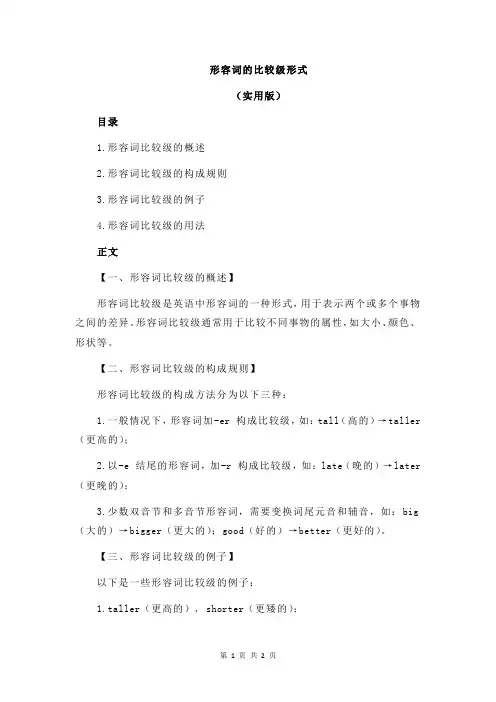
形容词的比较级形式(实用版)目录1.形容词比较级的概述2.形容词比较级的构成规则3.形容词比较级的例子4.形容词比较级的用法正文【一、形容词比较级的概述】形容词比较级是英语中形容词的一种形式,用于表示两个或多个事物之间的差异。
形容词比较级通常用于比较不同事物的属性,如大小、颜色、形状等。
【二、形容词比较级的构成规则】形容词比较级的构成方法分为以下三种:1.一般情况下,形容词加-er 构成比较级,如:tall(高的)→taller (更高的);2.以-e 结尾的形容词,加-r 构成比较级,如:late(晚的)→later (更晚的);3.少数双音节和多音节形容词,需要变换词尾元音和辅音,如:big (大的)→bigger(更大的);good(好的)→better(更好的)。
【三、形容词比较级的例子】以下是一些形容词比较级的例子:1.taller(更高的), shorter(更矮的);2.faster(更快的),slower(更慢的);3.stronger(更强的),weaker(更弱的);rger(更大的),smaller(更小的);5.brighter(更亮的),darker(更暗的)。
【四、形容词比较级的用法】形容词比较级通常用于以下三种情况:1.表示两者之间的比较,如:She is taller than her sister.(她比她妹妹高。
)2.表示三者或以上之间的比较,如:This book is the most interesting of the three.(这本书是三本中最有趣的。
)3.表示程度的加深,如:He is very tall.(他非常高。
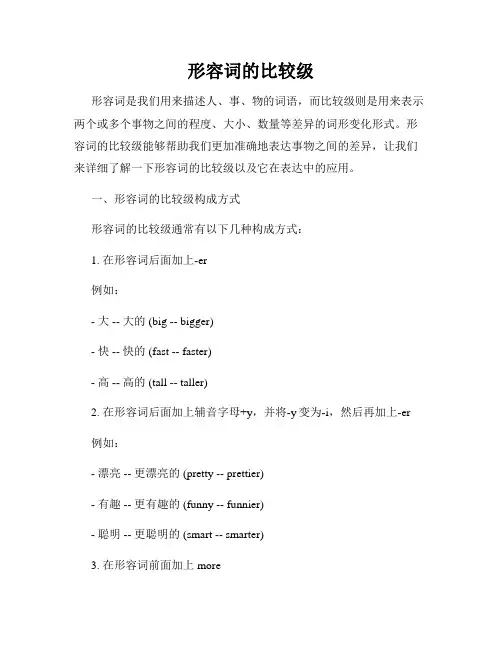
形容词的比较级形容词是我们用来描述人、事、物的词语,而比较级则是用来表示两个或多个事物之间的程度、大小、数量等差异的词形变化形式。
形容词的比较级能够帮助我们更加准确地表达事物之间的差异,让我们来详细了解一下形容词的比较级以及它在表达中的应用。
一、形容词的比较级构成方式形容词的比较级通常有以下几种构成方式:1. 在形容词后面加上-er例如:- 大 -- 大的 (big -- bigger)- 快 -- 快的 (fast -- faster)- 高 -- 高的 (tall -- taller)2. 在形容词后面加上辅音字母+y,并将-y变为-i,然后再加上-er例如:- 漂亮 -- 更漂亮的 (pretty -- prettier)- 有趣 -- 更有趣的 (funny -- funnier)- 聪明 -- 更聪明的 (smart -- smarter)3. 在形容词前面加上more例如:- 有名 -- 更有名的 (famous -- more famous)- 幸福 -- 更幸福的 (happy -- more happy)- 美丽 -- 更美丽的 (beautiful -- more beautiful)注意:有些形容词的比较级是不规则的,它们的形式变化与一般规则不同,需要我们单独记忆和掌握,例如:- 好 -- 更好的 (good -- better)- 少 -- 更少的 (little -- less)- 多 -- 更多的 (much -- more)二、形容词的比较级的用法形容词的比较级在英语中有广泛的应用,下面列举一些常见的用法:1. 表示两个事物之间的程度、大小、数量等差异例如:- Tom比Mike更高。
(Tom is taller than Mike.)- 我的狗比你的狗更聪明。
(My dog is smarter than yours.)- 这本书比那本书更有趣。
(This book is funnier than that one.)2. 表示某个事物在同类事物中更具特征或特点例如:- 这家餐厅的服务比其他餐厅更好。
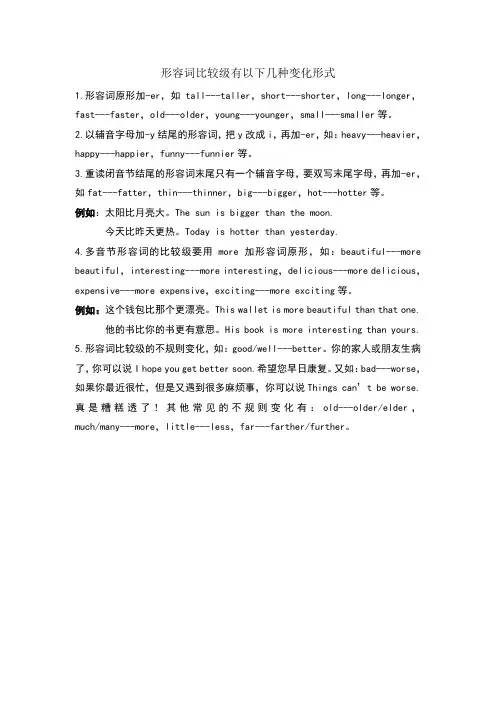
形容词比较级有以下几种变化形式1.形容词原形加-er,如tall---taller,short---shorter,long---longer,fast---faster,old---older,young---younger,small---smaller等。
2.以辅音字母加-y结尾的形容词,把y改成i,再加-er,如:heavy---heavier,happy---happier,funny---funnier等。
3.重读闭音节结尾的形容词末尾只有一个辅音字母,要双写末尾字母,再加-er,如fat---fatter,thin---thinner,big---bigger,hot---hotter等。
例如:太阳比月亮大。
The sun is bigger than the moon.今天比昨天更热。
Today is hotter than yesterday.4.多音节形容词的比较级要用more加形容词原形,如:beautiful---more beautiful,interesting---more interesting,delicious---more delicious,expensive---more expensive,exciting---more exciting等。
例如:这个钱包比那个更漂亮。
This wallet is more beautiful than that one.他的书比你的书更有意思。
His book is more interesting than yours.5.形容词比较级的不规则变化,如:good/well---better。
你的家人或朋友生病了,你可以说I hope you get better soon.希望您早日康复。
又如:bad---worse,如果你最近很忙,但是又遇到很多麻烦事,你可以说Things can’t be worse.真是糟糕透了!其他常见的不规则变化有:old---older/elder,much/many---more,little---less,far---farther/further。
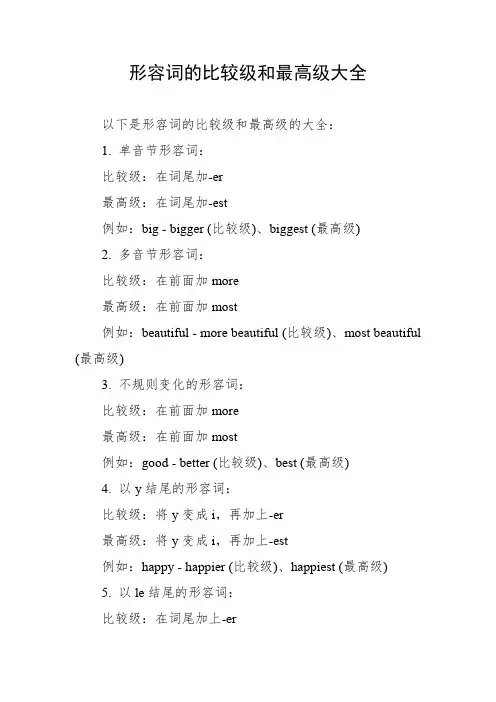
形容词的比较级和最高级大全以下是形容词的比较级和最高级的大全:1. 单音节形容词:比较级:在词尾加-er最高级:在词尾加-est例如:big - bigger (比较级)、biggest (最高级)2. 多音节形容词:比较级:在前面加more最高级:在前面加most例如:beautiful - more beautiful (比较级)、most beautiful (最高级)3. 不规则变化的形容词:比较级:在前面加more最高级:在前面加most例如:good - better (比较级)、best (最高级)4. 以y结尾的形容词:比较级:将y变成i,再加上-er最高级:将y变成i,再加上-est例如:happy - happier (比较级)、happiest (最高级)5. 以le结尾的形容词:比较级:在词尾加上-er最高级:在词尾加上-est例如:possible - more possible (比较级)、most possible (最高级)6. 少数不规则变化的形容词:比较级:在前面加more最高级:在前面加most例如:famous - more famous (比较级)、most famous (最高级)7. 特殊的比较级和最高级:例如:well - better (比较级)、best (最高级)8. 副词的比较级和最高级:比较级:在后面加-er最高级:在后面加-est例如:slowly - more slowly (比较级)、most slowly (最高级)以上是常见的形容词的比较级和最高级,但是也有一些不规则变化的形容词需要记忆。
同时,需要注意的是,有些形容词没有比较级和最高级,如unique。
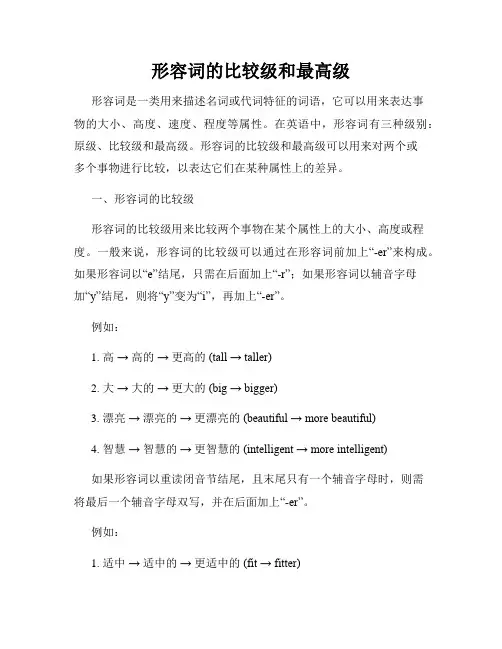
形容词的比较级和最高级形容词是一类用来描述名词或代词特征的词语,它可以用来表达事物的大小、高度、速度、程度等属性。
在英语中,形容词有三种级别:原级、比较级和最高级。
形容词的比较级和最高级可以用来对两个或多个事物进行比较,以表达它们在某种属性上的差异。
一、形容词的比较级形容词的比较级用来比较两个事物在某个属性上的大小、高度或程度。
一般来说,形容词的比较级可以通过在形容词前加上“-er”来构成。
如果形容词以“e”结尾,只需在后面加上“-r”;如果形容词以辅音字母加“y”结尾,则将“y”变为“i”,再加上“-er”。
例如:1. 高→ 高的→ 更高的(tall → taller)2. 大→ 大的→ 更大的(big → bigger)3. 漂亮→ 漂亮的→ 更漂亮的(beautiful → more beautiful)4. 智慧→ 智慧的→ 更智慧的(intelligent → more intelligent)如果形容词以重读闭音节结尾,且末尾只有一个辅音字母时,则需将最后一个辅音字母双写,并在后面加上“-er”。
例如:1. 适中→ 适中的→ 更适中的(fit → fitter)需要注意的是,有一些形容词的比较级是不规则的,需要单独记忆。
下面是一些常见的不规则比较级形式:1. 好→ 好的→ 更好的(good → better)2. 小→ 小的→ 更小的 (l ittle → less)3. 多→ 多的→ 更多的(many → more)4. 远→ 远的→ 更远的(far → farther/further)形容词的比较级在句子中一般用于比较两个事物之间的差异。
比较级可以与"than"搭配使用,构成比较结构。
例如:1. 这本书比那本书更有趣。
(This book is more interesting than that book.)2. 这座建筑物比那座建筑物高得多。
(This building is much tallerthan that building.)二、形容词的最高级形容词的最高级用来表达一组事物中某个属性的极限。
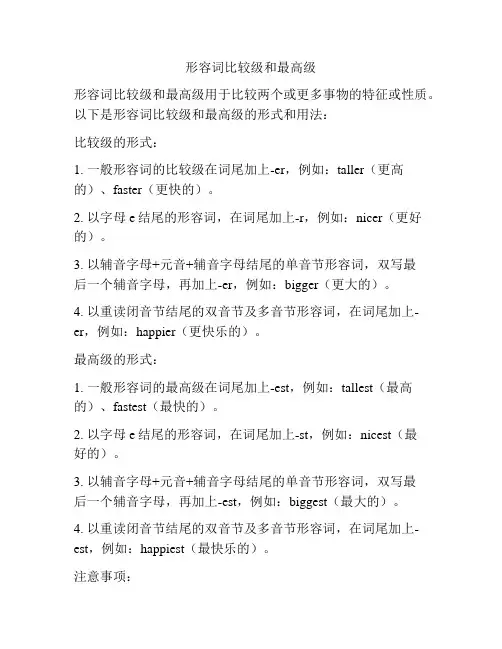
形容词比较级和最高级形容词比较级和最高级用于比较两个或更多事物的特征或性质。
以下是形容词比较级和最高级的形式和用法:比较级的形式:1. 一般形容词的比较级在词尾加上-er,例如:taller(更高的)、faster(更快的)。
2. 以字母e结尾的形容词,在词尾加上-r,例如:nicer(更好的)。
3. 以辅音字母+元音+辅音字母结尾的单音节形容词,双写最后一个辅音字母,再加上-er,例如:bigger(更大的)。
4. 以重读闭音节结尾的双音节及多音节形容词,在词尾加上-er,例如:happier(更快乐的)。
最高级的形式:1. 一般形容词的最高级在词尾加上-est,例如:tallest(最高的)、fastest(最快的)。
2. 以字母e结尾的形容词,在词尾加上-st,例如:nicest(最好的)。
3. 以辅音字母+元音+辅音字母结尾的单音节形容词,双写最后一个辅音字母,再加上-est,例如:biggest(最大的)。
4. 以重读闭音节结尾的双音节及多音节形容词,在词尾加上-est,例如:happiest(最快乐的)。
注意事项:1. 有些形容词的比较级和最高级形式是不规则的,例如:good (better,best)、bad(worse,worst)。
2. 当形容词以-y结尾时,变为-i加-er或-i加-est,例如:funny (funnier,funniest)。
3. 对于很多双音节或多音节的形容词,可以在前面加上more (比较级)或most(最高级)来构建比较级或最高级形式,例如:beautiful(more beautiful,most beautiful)。
使用比较级和最高级时,常用的表达方式有:1. 比较级+than(比……更……):He is taller than his brother.(他比他兄弟更高。
)2. the+最高级+of(最……的……):She is the smartest student in the class.(她是班里最聪明的学生。
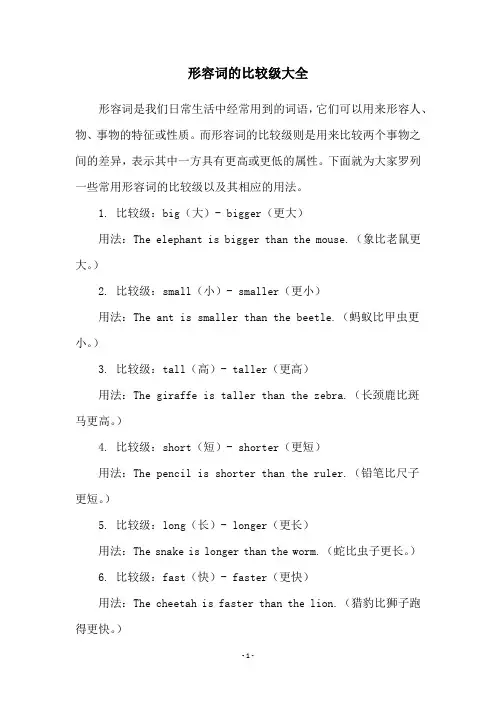
形容词的比较级大全形容词是我们日常生活中经常用到的词语,它们可以用来形容人、物、事物的特征或性质。
而形容词的比较级则是用来比较两个事物之间的差异,表示其中一方具有更高或更低的属性。
下面就为大家罗列一些常用形容词的比较级以及其相应的用法。
1. 比较级:big(大)- bigger(更大)用法:The elephant is bigger than the mouse.(象比老鼠更大。
)2. 比较级:small(小)- smaller(更小)用法:The ant is smaller than the beetle.(蚂蚁比甲虫更小。
)3. 比较级:tall(高)- taller(更高)用法:The giraffe is taller than the zebra.(长颈鹿比斑马更高。
)4. 比较级:short(短)- shorter(更短)用法:The pencil is shorter than the ruler.(铅笔比尺子更短。
)5. 比较级:long(长)- longer(更长)用法:The snake is longer than the worm.(蛇比虫子更长。
) 6. 比较级:fast(快)- faster(更快)用法:The cheetah is faster than the lion.(猎豹比狮子跑得更快。
)7. 比较级:slow(慢)- slower(更慢)用法:The turtle is slower than the rabbit.(乌龟比兔子跑得更慢。
)8. 比较级:easy(容易)- easier(更容易)用法:The multiple-choice test is easier than the essay test.(选择题比论述题更容易。
)9. 比较级:difficult(困难)- more difficult(更困难)用法:Calculus is more difficult than algebra.(微积分比代数更困难。
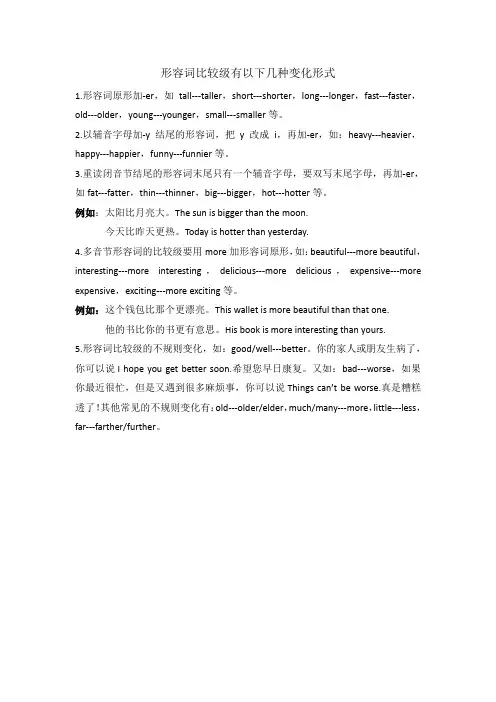
形容词比较级有以下几种变化形式1.形容词原形加-er,如tall---taller,short---shorter,long---longer,fast---faster,old---older,young---younger,small---smaller等。
2.以辅音字母加-y结尾的形容词,把y改成i,再加-er,如:heavy---heavier,happy---happier,funny---funnier等。
3.重读闭音节结尾的形容词末尾只有一个辅音字母,要双写末尾字母,再加-er,如fat---fatter,thin---thinner,big---bigger,hot---hotter等。
例如:太阳比月亮大。
The sun is bigger than the moon.今天比昨天更热。
Today is hotter than yesterday.4.多音节形容词的比较级要用more加形容词原形,如:beautiful---more beautiful,interesting---more interesting,delicious---more delicious,expensive---more expensive,exciting---more exciting等。
例如:这个钱包比那个更漂亮。
This wallet is more beautiful than that one.他的书比你的书更有意思。
His book is more interesting than yours.5.形容词比较级的不规则变化,如:good/well---better。
你的家人或朋友生病了,你可以说I hope you get better soon.希望您早日康复。
又如:bad---worse,如果你最近很忙,但是又遇到很多麻烦事,你可以说Things can’t be worse.真是糟糕透了!其他常见的不规则变化有:old---older/elder,much/many---more,little---less,far---farther/further。
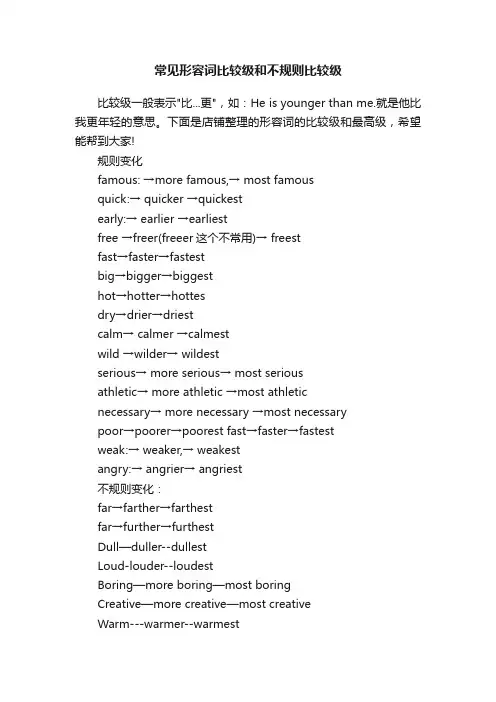
常见形容词比较级和不规则比较级比较级一般表示"比...更",如:He is younger than me.就是他比我更年轻的意思。
下面是店铺整理的形容词的比较级和最高级,希望能帮到大家!规则变化famous: →more famous,→ most famousquick:→ quicker →quickestearly:→ earlier →earliestfree →freer(freeer这个不常用)→ freestfast→faster→fastestbig→bigger→biggesthot→hotter→hottesdry→drier→driestcalm→ calmer →calmestwild →wilder→ wildestserious→ more serious→ most seriousathletic→ more athletic →most athleticnecessary→ more necessary →most necessarypoor→poorer→poorest fast→faster→fastestweak:→ weaker,→ weakestangry:→ angrier→ angriest不规则变化:far→farther→farthestfar→further→furthestDull—duller--dullestLoud-louder--loudestBoring—more boring—most boringCreative—more creative—most creativeWarm---warmer--warmestExpensive—more expensive—most expensivehigh,higher,highest large,larger,largestwet, wetter,wettest busy,busier,busiestdelicious,more delicious,most deliciousheavy,heavier,heaviestdry,drier,driesteasy easier easiestlazy lazier laziestpretty prettier prettiestnaughty naughtier naughtiestmealy mealier mealiestearly earlier earliestthirsty thirstier thirstiestgood / well→better→bestbad / ill→worse→worstmany / much→more→mostlittle→less→leastlate→later→ / latestlate→latter→last形容词和副词的比较级口诀及用法英语语法顺口溜:形容词和副词的比较级口诀一者比较用原级。
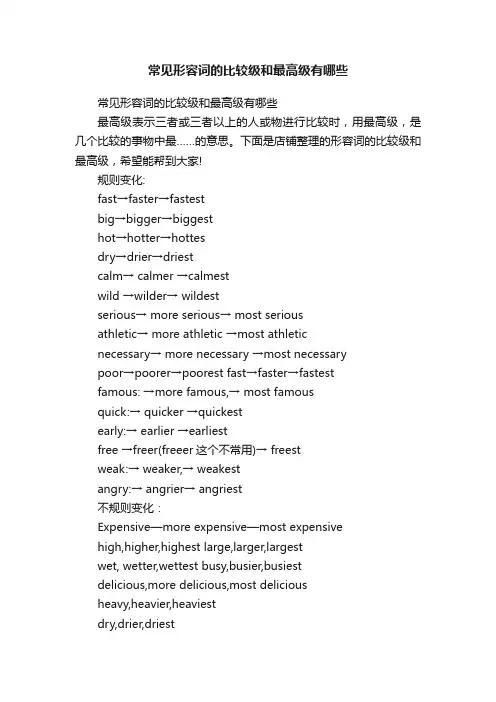
常见形容词的比较级和最高级有哪些常见形容词的比较级和最高级有哪些最高级表示三者或三者以上的人或物进行比较时,用最高级,是几个比较的事物中最……的意思。
下面是店铺整理的形容词的比较级和最高级,希望能帮到大家!规则变化:fast→faster→fastestbig→bigger→biggesthot→hotter→hottesdry→drier→driestcalm→ calmer →calmestwild →wilder→ wildestserious→ more serious→ most seriousathletic→ more athletic →most athleticnecessary→ more necessary →most necessarypoor→poorer→poorest fast→faster→fastestfamous: →more famous,→ most famousquick:→ quicker →qu ickestearly:→ earlier →earliestfree →freer(freeer这个不常用)→ freestweak:→ weaker,→ weakestangry:→ angrier→ angriest不规则变化:Expensive—more expensive—most expensivehigh,higher,highest large,larger,largestwet, wetter,wettest busy,busier,busiestdelicious,more delicious,most deliciousheavy,heavier,heaviestdry,drier,driesteasy easier easiestlazy lazier laziestpretty prettier prettiestnaughty naughtier naughtiestmealy mealier mealiestearly earlier earliestthirsty thirstier thirstiestfar→farther→farthestfar→further→furthestDull—duller--dullestLoud-louder--loudestBoring—more boring—most boringCreative—more creative—most creativeWarm---warmer--warmestgood / well→better→bestbad / ill→worse→worstmany / much→more→mostlittle→less→leastlate→later→ / latestlate→latter→last【拓展】关于形容词和副词的比较级一、含义1. 大多数形容词和副词有三个等级:原级、比较级、最高级: good – better - best2. 比较级:表示两者(人或物)之间的比较。
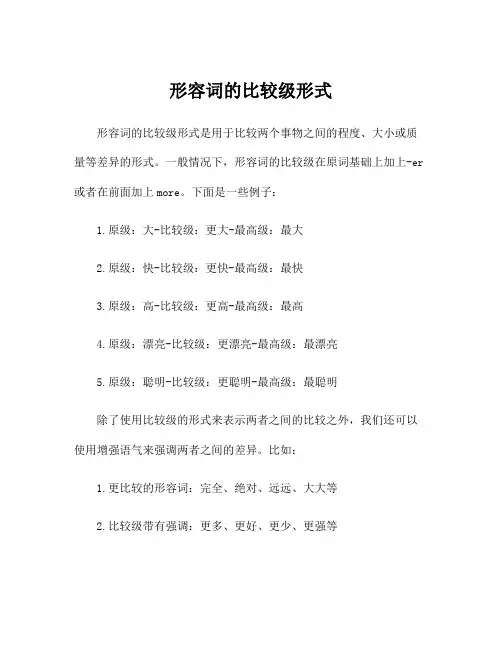
形容词的比较级形式
形容词的比较级形式是用于比较两个事物之间的程度、大小或质量等差异的形式。
一般情况下,形容词的比较级在原词基础上加上-er 或者在前面加上more。
下面是一些例子:
1.原级:大-比较级:更大-最高级:最大
2.原级:快-比较级:更快-最高级:最快
3.原级:高-比较级:更高-最高级:最高
4.原级:漂亮-比较级:更漂亮-最高级:最漂亮
5.原级:聪明-比较级:更聪明-最高级:最聪明
除了使用比较级的形式来表示两者之间的比较之外,我们还可以使用增强语气来强调两者之间的差异。
比如:
1.更比较的形容词:完全、绝对、远远、大大等
2.比较级带有强调:更多、更好、更少、更强等
此外,有一些形容词的比较级形式是不规则的,需要特别记忆,例如:
1.原级:好-比较级:更好-最高级:最好
2.原级:少-比较级:较少或更少-最高级:最少
3.原级:远-比较级:较远或更远-最高级:最远
在实际应用中,可以根据需要使用适当的比较级形式来表达差异和强调。
形容词比较级大全总结形容词是我们日常生活中经常使用的词语,形容词的比较级用于表示比较两个或多个事物的特征或属性。
比较级的运用可以使我们的语言更加生动有力,让描述更加准确。
本文将为您总结一些常见的形容词比较级,希望对您的写作和表达能起到一定的帮助。
一、单音节形容词的比较级对于单音节形容词,我们可以直接在形容词后面加上-er来构成其比较级。
以下是一些常见的单音节形容词比较级的例子:1.hot(热)→ hotter(更热)2.cold(冷)→ colder(更冷)3.tall(高)→ taller(更高)4.short(矮)→ shorter(更矮)5.long(长)→ longer(更长)6.old(老)→ older(更老)需要注意的是,以一个辅音字母加y结尾的形容词,要在比较级中将y变为i,再加-er构成比较级。
例如:1.happy(高兴)→ happier(更高兴)2.angry(生气)→ angrier(更生气)3.easy(容易)→ easier(更容易)二、双音节形容词的比较级对于双音节形容词,一般是在词前加上more(更)构成比较级。
以下是一些常见的双音节形容词比较级的例子:1.beautiful(美丽)→ more beautiful(更美丽)2.expensive(昂贵)→ more expensive(更昂贵)3.interesting(有趣)→ more interesting(更有趣)4.important(重要)→ more important(更重要)5.intelligent(聪明)→ more intelligent(更聪明)6.polite(礼貌)→ more polite(更礼貌)需要注意的是,有一些双音节形容词的比较级是通过改变形容词的词根来构成的。
例如:1.good(好)→ better(更好)2.bad(坏)→ worse(更坏)3.little(小)→ less(更小)三、三音节及以上形容词的比较级对于三音节及以上的形容词,一般也是在词前加上more(更)构成比较级,或者通过改变形容词的词根来构成比较级。
形容词的比较级
1. 形容词比较级:taller更高的,shorter更矮的,stronger更强壮的,thinner 更瘦得,older年龄更大的,younger更年轻的,bigger更大的,smaller更小的,longer更长的,heavier更重的。
2. 形容词比较级的构成:
(1). 一般直接加er, 如:tall—taller, short—shorter, small—smaller.
(2). 单音节词如果以e结尾,只加r, 如:strange—stranger.
(3). 闭音节单音节词如末尾只有一个辅音字母,须先双写这个辅音字母,再
加r,如:big—bigger, thin—thinner, hot—hotter
(4). 以辅音字母+y结尾的词,变y为i加er, 如:heavy—heavier, funny-funnier.
(5). 双音节和多音节词在前面加more, 如:more beautiful.
(6). 特殊形式,如:good—better, many—more.
3. A +is(are)+形容词比较级+than +B.
本句是形容词比较级的典型用法,表示A比B更….。
常用在两者在某一方面作比较时,如:You are 10 cm taller than me.你比我高10厘米。
The monkey is thinner that one. 这只猴子比那只瘦。
强化训练
翻译:
1. 你的狗比我的大。
2. 我比你大四岁。
Keys: 1. My dog is bigger than yours. 2. I’m four years older than you.。
形容词的比较级和最高级1.在形容词词尾加上“er”“est ”构成比较级、最高级:bright (明亮的)一brighter—brightest —broader—broadestcheap (便宜的)一cheaper—cheapest —cleaner—cleanestclever (聪明的)—cleverer—cleverest —colder—coldestcool (凉的)—cooler—coolest —darker—darkestdear (贵的)—dearer—dearest —deeper—deepestfast (迅速的)一faster—fastest —fewer—fewestgreat (伟大的)一greater—greatest —harder—hardesthigh (高的)—higher—highest —kinder—kindestlight (轻的)—lighter—lightest —longer—longestloud (响亮的)一louder—loudest —lower—lowestbroad (广阔的)clean (干净的)cold (寒冷的)dark (黑暗的)deep (深的)few (少的)hard (困难的,硬的)kind (善良的)long (长的)—newer —newestpoor (穷的) —poorer —poorest —quicker —quickestquiet (安静的) 一quieter —quietest —richer —richestshort (短 的)一shorter —shortest —slower —slowestsmall (小的)—smaller —smallest —smarter —smartestsoft (柔软的)一softer —softest —stronger —strongestsweet (甜的)—sweeter —sweetest thick (厚的)一thicker —thickest —warmer —warmestweak (弱的) —weaker —weakest —younger —youngest2,双写最后一个字母,再加上“er” big (大的)一bigger —biggestfat (胖的)一fatter —fattest hot (热的)一hotter —hottestred (红的)—redder —reddestnear (近的)—nearer —nearest new (新的)quick (快的)rich (富裕的)slow (慢的)smart (聪明的)strong (强壮的)tall (高的)-taller-tallest warm (温暖的)young (年轻的)sad (伤心的)一sadder—saddest thin (瘦的)—thinner—thinnestwet (湿的)一wetter—wettest mad (疯的)—madder—maddest3.以不发音的字母e结尾的形容词,加上“r” “st”构成比较级、最高级:able (能干的)一abler—ablest brave (勇敢的)—braver—bravestclose(接近的)一closer—closest fine(好的,完美的)—finer—finestlarge (巨大的)一larger-largest late (迟的)—later—latestnice (好的)一nicer—nicest ripe (成熟的)—riper—ripestrude (粗鲁的)一ruder—rudest safe (安全的)—safer—safeststrange (奇怪的)—stranger—strangest wide (宽广的)—wider—widestwise (睿智的,聪明的)一wiser—wisest white (白的)—whiter—whitest4.以字母y结尾的形容词,把y改为i,再加上“er”“est”构成比较级、最高级:busy (忙碌的)一busier—busiest dirty (脏的)—dirtier—dirtiestdry (干燥的)一drier—driestearly (早的)—earlier—earliesteasy (容易的)—easier—easiest friendly (友好的)—friendlier—friendliestfunny (好玩的)—funnier—funniest happy (开心的)—happier—happiesthealthy (健康的)—healthier—healthiest heavy (重的)—heavier—heaviesthungry (饿的)一hungrier—hungriest lazy (懒惰的)—lazier—laziestlucky (幸运的)—luckier—luckiest naughty (调皮的)—naughtier—naughtiestnoisy (嘈杂的)一noisier—noisiest pretty (美丽的)—prettier—prettiestsilly (傻的)一sillier—silliest spicy (辣的)—spicier—spiciestthirsty (渴的)一thirstier—thirstiest ugly (丑的)—uglier—ugliest5,双音节、多音节形容词,在单词前面加上“more”“most”构成比较级、最高级:afraid (害怕的)—more afraid—most afraidbeautiful (美丽的)—more beautiful—most beautifulcareful (仔细的)—more careful—most carefulcheerful (开心的)—more cheerful—most cheerfulcrowded (拥挤的)—more crowded—most crowdeddangerous (危险的)—more dangerous—most dangerous delicious (美味的)—more delicious—most deliciousdifficult (困难的)一more difficult—most difficultexciting (令人兴奋的)一more exciting—most excitingexpensive (昂贵的)—more expensive—most expensivefamous (著名的)一more famous—most famousfrightened (受惊的)—more frightened—most frightened frightening (令人害怕的)—more frightening—most frightening hard-working (勤奋的)—more hard-working—most hard-working helpful (有帮助的)一more helpful—most helpfulhonest (诚实的)—more honest—most honestimportant (重要的)一more important—most important interesting (有趣的)一more interesting—most interestingpolite (有礼貌的)—more polite—most politeterrible (可怕的)—more terrible—most terribletired (累的)—more tired—most tired6.不规则变化的形容词:bad (坏的)一worse—worst far (远的)一farther—farthest(far—further—furthest)good (好的)一better—best ill (病的)一worse—worstlittle (少的)一less—least many (多的)一more—most much (多的)一more—mostold (年老的)一older—oldest ( old—elder—eldest) well (好的,身体好的)一better-best。
在英语中,形容词的比较级用于比较两个事物或人的特征。
通常情况下,比较级的形成有以下规则:1. 对于单音节形容词,通常在词尾加上 "-er" 来形成比较级。
- Fast → Faster- Small → Smaller- High → Higher2. 对于部分双音节形容词,也可以在词尾加上"-er",尤其是那些以"y" 结尾的形容词,变 "y" 为 "i" 再加 "-er"。
- Happy → Happier- Easy → Easier- Pretty → Prettier3. 对于多音节形容词和部分双音节形容词,通常在形容词前面加上 "more" 来形成比较级。
- Beautiful → More beautiful- Expensive → More expensive- Important → More important4. 不规则形容词的比较级需要单独记忆,因为它们不遵循上述规则。
- Good → Better- Bad → Worse- Far → Farther/Further使用比较级时,通常会和 "than" 这个词一起使用来进行比较。
例如:- She is happier than I am.- This book is more interesting than that one.- He runs faster than she does.记住这些规则可以帮助你正确地使用和构造英语形容词的比较级。